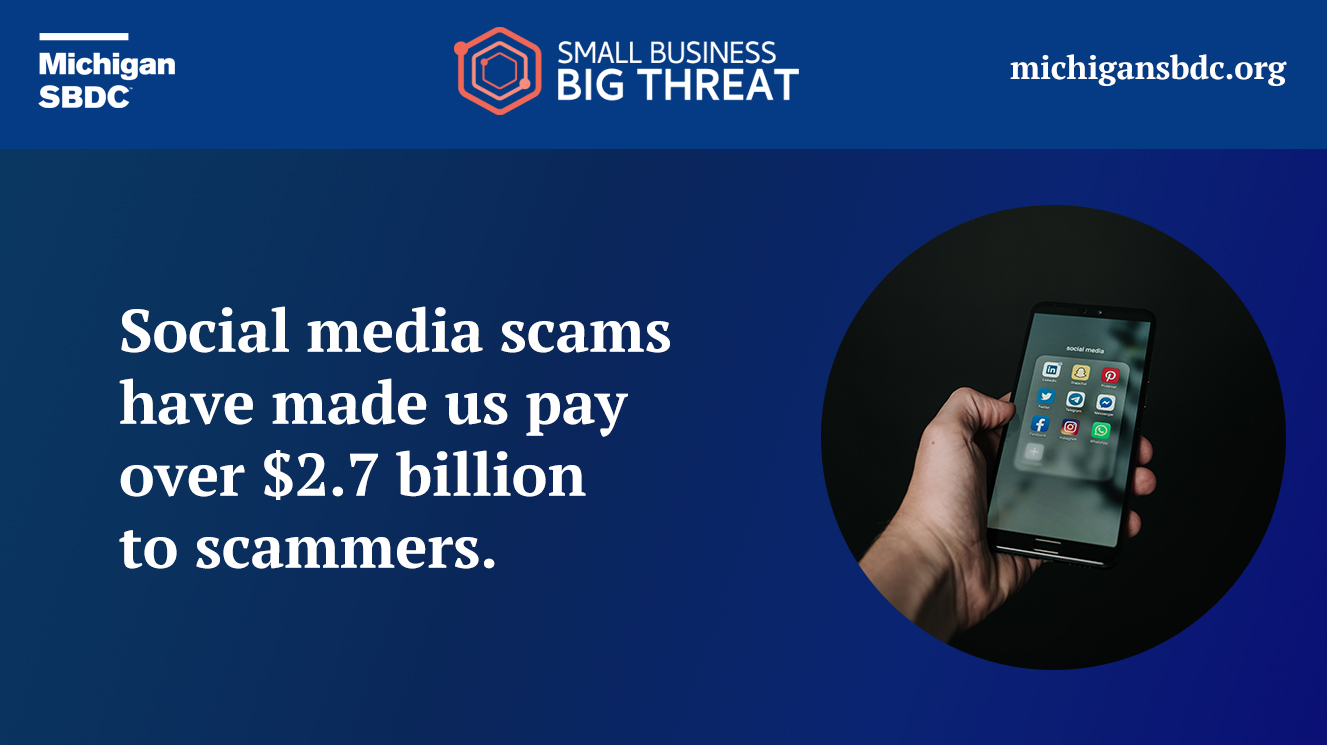 Social media scams make us pay! How much do they make us pay? In the billions since 2021 according to the Federal Trade Commission. The FTC reports that since 2021, social media scams have made us pay over $2.7 billion to scammers. This number only includes reported losses, so the number is surely higher as not everyone reports when they are scammed. In this Security Byte we will talk about the reasons why someone may not report a scam, the steps you can take to protect your small business, and how you can report the scam if you fall victim.
Social media scams make us pay! How much do they make us pay? In the billions since 2021 according to the Federal Trade Commission. The FTC reports that since 2021, social media scams have made us pay over $2.7 billion to scammers. This number only includes reported losses, so the number is surely higher as not everyone reports when they are scammed. In this Security Byte we will talk about the reasons why someone may not report a scam, the steps you can take to protect your small business, and how you can report the scam if you fall victim.
Why we don’t report
Here are three common reasons why scams aren’t reported:
- It can be embarrassing to admit
- Not worth your time
- Not sure where to report it
For many, it can be embarrassing if they fell victim and they do not want others to know. They may not want to appear foolish, especially if their business reputation could be damaged because of falling victim.
Others may decide reporting the scam just isn’t worth the time as they only lost a few dollars. So it is not worth the hassle of submitting a report and dealing with any followup.
Lastly, who reading this Security Byte knows where you can report these types of scams? Now maybe you are thinking of the FTC as I cited them above, in which you’d be correct! Knowing who you can report to that might be able to help or help others though isn’t all that well known.
Steps you can take
The first step is to understand that social media is full of scams. Whether it is shopping scams, romance frauds, undelivered purchases, investment scams, or the ‘urgent message from family or friend’ scams.
The next step is treating social media like email, examining posts and DMs as if they’re phishing you. You may trust the poster or the messenger, but you still need to verify if it is safe.
You can do this in a similar way you verify emails. Contact your family member or friend through another secure means of communication to verify it is them. If there is an advertisement for a sale, go to the store’s legitimate website and try to verify if the sale is offered on the site too. If the investment seems too good to be true, the return is incredible, then it is probably too good to be true!
Where to report
I recommend reporting these types of scams, especially when you lose money to either the FTC or the FBI.
According to the FTC after filing a complaint, “The FTC uses reports like yours to investigate and bring cases against fraud, scams, and bad business practices, but can’t resolve reports on behalf of individuals. But we will share your report with more than 2,800 law enforcement partners. The FTC also uses reports to spot trends, educate the public, and share data about what is happening in your community. When the FTC brings cases, we try to get money back for people.” This means you may be contacted for follow up.
According to the FBI after filing a complaint, “Trained analysts at the IC3 review and research the complaints, disseminating information to federal, state, local, or international law enforcement or regulatory agencies for criminal, civil, or administrative action, as appropriate.” This means you may be contacted for follow up.
To learn more on protecting your small business from social media scams and other cybersecurity threats checkout Small Business, Big Threat!